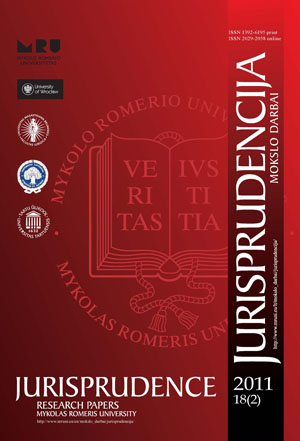Europos Sąjungos pilietybė, nacionalinės socialinės apsaugos sistemos ir socialinis solidarumas
European Union Citizenship, National Welfare Systems and Social Solidarity
Author(s): Koen LenaertsSubject(s): Law, Constitution, Jurisprudence
Published by: Mykolas Romeris University
Keywords: EU citizenship; free movement; social solidarity; national welfare systems; ‘genuine or real link’; integration; social benefits
Summary/Abstract: The purpose of the present contribution is to explore how the ECJ seeks to respect the principles underpinning national welfare systems, notably social solidarity, whilst ensuring that Member States comply with the substantive law of the European Union, in particular with the Treaty provisions on the fundamental freedoms and EU citizenship. It is submitted that in order to reconcile those two interests the ECJ has taken the view that nationals of the host Member State must show a certain degree of financial solidarity with the nationals of other Member States who have established a ‘genuine or real link’ with the society of that State. With a view to establishing the existence of such a link, national authorities of the host Member State must engage in a case-by-case assessment of the personal circumstances of the EU citizen claiming social benefits. However, Förster is an important exception to the individual application of the ‘genuine or real link’ test. Although Förster does not overrule Bidar as a matter of principle, it exempts the host Member State from examining the personal situation of economically inactive students who apply for maintenance grants or student loans but have not yet completed a five-year period of residence. Moreover, compliance with residence requirements is an important factor which may determine the extent to which a person has become integrated into the society of the host Member State;but it is by no means the only one. Other factors, such as the fact that the person claiming social benefits has previously worked in the host Member State or is a national of that State, may be of relevance. Finally, this contribution supports the contention that it is possible to read Collins, Bidar, and Nerkowska consistently, on the ground that residence requirements do not carry the same weight for the establishment of links with the society of the host Member State as for the dissolution of the existing links with the society of the home Member State. This distinction encourages free movement of EU citizens: they should be able to exercise their right to free movement without having to fear that the strong ties they maintain with the society of their home Member State will be loosened.
Journal: Jurisprudencija
- Issue Year: 18/2011
- Issue No: 2
- Page Range: 397-422
- Page Count: 26
- Language: English

